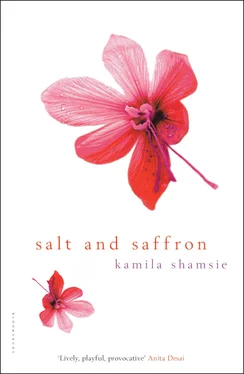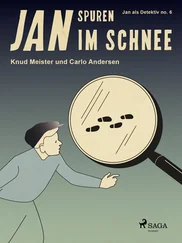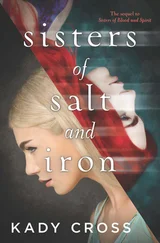In our house, the only meal that ever surpassed those Ramzan meals was the one Masood and Mariam Apa conjured up for me the day I was accepted at a college in America. Halfway through the meal I burst into tears to say, ‘But who will cook for me when I’m there?’
Masood almost touched my shoulder, said, ‘Don’t worry, Aliya Bibi.’ It was the first time he’d ever called me ‘Bibi’ and the deference it implied made me feel even more miserable. ‘When you come home for the holidays I’ll feed you so much they’ll have to roll you back on to the plane.’
‘Promise?’ I said.
‘Promise.’ He smiled back.
Two weeks later he was gone.
I pulled the airline blanket over my face and tried to regulate my breathing, which had become ragged just thinking about Masood’s departure and what followed.
When I told Samia that I never told Mariam Apa’s story, I wasn’t entirely honest. Admittedly, I’d never said it aloud in one go, but in dribs and drabs I’d hinted at, implied and blurted out every fragment of it at college to my roommate, Celeste. Brilliant, artistic, revolutionary, multi-multi-ethnic and entirely unpindownable Celeste, who moved into our room at the start of freshman year while I was still in transit and decided to make me feel at home in Massachusetts by customizing her reproduction of Che Guevara. Imagine me, walking into the airy, brightly coloured dorm-room and seeing a six-foot-by-three-foot painting of a long-haired man with beautiful eyes, a mango in one hand and a cricket bat in the other, his teeth red with blood.
Betel-nut juice, Celeste explained weeks later, when I felt I could query her artistic judgement.
The first thing Celeste asked me when I’d unpacked was, ‘Who is she?’ She was Mariam Apa, captured in black and white, framed and displayed on my desk. I evaded answering in any detail until the end of that semester, when Celeste announced, ‘I’m going to make a painting of your cousin, Mariam. You got any input on that?’
‘Yes. Can you paint her older? So I’ll have some way of knowing how age might change her face.’
Celeste turned her attention away from the picture of Mariam Apa and towards me. ‘It’s more common for people to want a painting to remove a few years from the sitter.’
I laughed. ‘The thought of Mariam Apa older … older and happy. Can you, who never knew her, imagine that? I so wish that I could.’
‘So she died?’ Celeste was never one for cloaking brutality in euphemism.
‘My grandmother would doubtless say it would be better if she had.’
‘Okay, spill.’
How Celeste made sense of the garble that followed, I’ll never know. But I’m clearer now. So, deep breath, forget about Massachusetts, forget about the flight, and let me take you to the day of Masood’s disappearance, two weeks after he called me Bibi.
I knew something was wrong the moment I returned from school and the only smell to assail my nostrils as I walked up the driveway was that of the manure recently delivered to my neighbour’s garden. Ami was standing in the kitchen as I ran in, staring in mystification at Masood’s rack of spices.
‘What’s happened? Where is he? Is he ill?’
‘No, no, he’s not ill. He had to leave. His father has died. Masood’s the head of the family now. So he’s gone.’
‘For how long?’ I didn’t stop for a moment to think about Masood’s loss; I just wondered how long I’d have to do without his cooking.
‘Jaan, he’s gone. They need him there. It’s feudal land, you know. It seems his father was the cook at the home of the zamindar, and Masood will be taking over that position. He said to tell you he’s sorry he didn’t have time to say goodbye, but he had to catch the morning train.’
‘But how will we …’ I looked around the kitchen, cavernous and strange. ‘What about Mariam Apa?’
Ami shook her head. ‘I don’t know. We’ve already found a new cook — the one who worked for your dadi when Mohommed was on leave — and he’s starting tomorrow, but I don’t know if Mariam … I don’t know what. I don’t know.’
All I was thinking was, I’ll never hear her voice again. But when I saw the flutter of Ami’s hands across the spice jars and her refusal to meet my eye, I thought, Oh dear God.
It’s not just that she only spoke to speak to him of food; she also only ate when it was his food she was eating. When Masood had taken his father on haj, two years earlier, he’d frozen a week’s supply of food for Mariam Apa so that she wouldn’t starve.
‘Where is she?’ I said.
‘In her room. When Masood was leaving he told her to keep eating, otherwise she’ll fall ill and cause him much pain. And she smiled and … hugged him. Briefly. She hugged him goodbye.’
I stared. A hug — across class and gender. And he wasn’t even much older than her. Before this had their fingers even touched as they passed a tomato from one to the other? I doubted it. A hug! I wouldn’t have, and Masood had carried me piggy-back style when I was a child.
But when I entered Mariam Apa’s room she was reclining in bed, reading the afternoon papers, as though it were just another day. I stood in the doorway, watching for the throbbing vein in her neck, for the inward curl of her fingers, for the awkwardly angled shoulders or the tooth biting down on her lip. But all I got, instead, was the tiniest alteration in the curve of her mouth to tell me she knew she was being watched.
‘Will you eat?’ I burst out, and flung myself across the bed. Without looking at me she shook her head. I touched her wrist and, still not turning her eyes towards me, she reached out and pushed my hair off my face with fingers so stiff I jerked my head back in fright. Rigor mortis, is what I absurdly thought when I should have been thinking of how hard she was trying not to tremble. But right then I could only see the hollows of her form. Hollow between clavicle and neck, hollow of cupped palm which held itself just short of supplication, hollow of her mouth.
I backed away and stood up. ‘You can’t do this to me.’
Her eyes closed and opened. And closed again.
Three days later she still hadn’t touched a morsel of food, and Aba was raging through the house, railing against the stubbornness of women. He was looking for a fight, of course, but Ami and I were too despondent to rise to the challenge.
In the silence that followed a protracted outburst we heard the door swing open. Auntie Tano, an old family friend, walked in.
‘Guess who I met?’ she said, after proffering her cheek all around to be kissed.
‘Why don’t you just tell us,’ Aba said.
‘Pinkie!’
‘I thought she was in London.’
‘No, no. The other Pinkie. Rash’s wife.’
Ami attempted interest. ‘Oh, really? How is she?’
‘Why do we care?’ Aba asked.
‘You care, my dear man, because she has just spent a week on the family lands with her brother, Jahangir.’
‘Jahangir! How is he?’
‘Really, why do we care?’
Ami slapped Aba lightly on the wrist. ‘Of course we care. Haven’t seen him in what? Three years? Ever since his wife died. He just stopped coming to the city. I don’t know why. You’d think he would get so lonely on the lands.’
‘Such a tragedy,’ Auntie Tano murmured, pressing the back of her hand against her forehead. ‘So young. I have a picture of them at our New Year’s party. They look so happy.’
‘Yes, well, it was a masquerade party,’ Aba observed.
‘Honestly. What a thing to say. Ayesha, look at what your husband is saying. They were quite happy together.’
‘Happy? Oh please. It was common knowledge he was having it off with any number of women.’ Aba picked up a newspaper and opened it with the air of one who has nothing further to learn from the conversation proceeding around him.
Читать дальше












